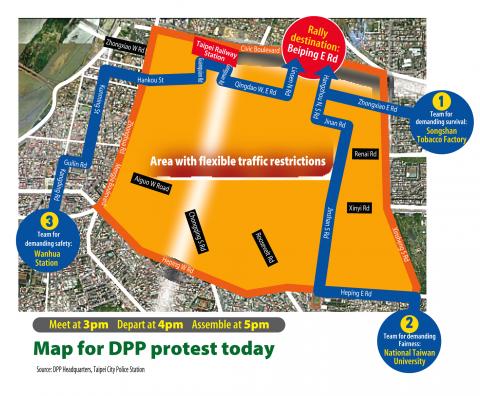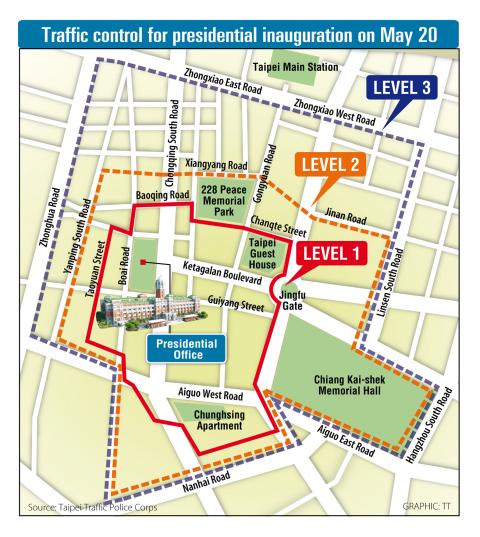Members of the People First Party are set to join a mass protest in Taipei spearheaded by the Democratic Progressive Party (DPP) today.
The DPP-sponsored protest which is galvanizing support under the banner “It’s hard to survive; the President needs to explain why,” will protest against President Ma Ying-jeou’s (馬英九) poor governance and controversial government plans including a proposal to ease US beef imports containing the growth additive ractopamine, increases in fuel and electricity costs and the “one country, two areas (一國兩區)” strategy touted by Chinese Nationalist Party (KMT) officials.
The protest will proceed from three assembly points: DPP acting chairperson Chen Chu (陳菊) will lead one group from Songshan Tobacco Factory (松山菸廠), another will be led by former DPP chairperson Tsai Ing-wen (蔡英文) and will start at National Taiwan University and a third is to be led by former premier Su Tseng-chang (蘇貞昌) starting at Wanhua Rail Station.

People are to meet at each of the three locations at 3pm and will begin their processions at 4pm. They plan to converge on Beiping E Road at 5pm, where a rally will be held.
Chen said yesterday that because the public is suffering, she has decided not to attend Ma’s second-term inauguration ceremony on Sunday.
The Taiwan Solidarity Union (TSU) yesterday said the party would take part in the DPP-sponsored demonstration and called for protesters to stage sit-ins through the night following the end of the DPP rally and then to attend the TSU-sponsored rally tomorrow.

The TSU’s rally is to start at Huashan Park (華山公園) at 8am and march to an area near the Presidential Office and end at Chongqing S Road by noon.
The PFP called a press conference yesterday saying the party encouraged its cadres and members to join pan-green initiated protests against Ma.
“We will not join the protest in the name of the party because we do not support the recall of Ma and the release of former president Chen Shui-bian (陳水扁), but we encourage party members to take part in an individual capacity,” PFP caucus whip Thomas Lee (李桐豪) said.
PFP Deputy Secretary-General Liu Wen-hsiung (劉文雄) said the party supports the demonstrations, but said the support is only limited to the issues related to gasoline and electricity price increases, the government-proposed capital gains tax on securities transactions and the plan to partially lift the ban on imports of US beef containing ractopamine.
“Don’t be surprised if you see PFP Chairman James Soong (宋楚瑜) in the crowd,” Liu said.
Lee urged Ma to either “step down voluntarily” or “retreat to the back line and delegate power to Premier Sean Chen” saying that people do not hold much hope for Ma’s second term.
Ma should seriously consider the two options if he fails to revive his sinking approval ratings within two months — the lowest ever recorded for any Taiwanese president in political history, he added.
Separately, KMT Legislator Apollo Chen (陳學聖) suggested that Ma hold a press conference and apologize to the public.
“Offering an apology would be just the beginning. Only when the president is willing to stand with the people and to make adjustments to his policy and key government personnel, is he likely to see his approval ratings climb,” he said.
KMT Legislator Yang Li-huan (楊麗環) was also of the opinion that Ma has to apologize first.
“But what would be more important is what he will do next. He has to explain the rationale of his policies to the people,” she said.

A magnitude 7.0 earthquake struck off Yilan at 11:05pm yesterday, the Central Weather Administration (CWA) said. The epicenter was located at sea, about 32.3km east of Yilan County Hall, at a depth of 72.8km, CWA data showed There were no immediate reports of damage. The intensity of the quake, which gauges the actual effect of a seismic event, measured 4 in Yilan County area on Taiwan’s seven-tier intensity scale, the data showed. It measured 4 in other parts of eastern, northern and central Taiwan as well as Tainan, and 3 in Kaohsiung and Pingtung County, and 2 in Lienchiang and Penghu counties and 1

FOREIGN INTERFERENCE: Beijing would likely intensify public opinion warfare in next year’s local elections to prevent Lai from getting re-elected, the ‘Yomiuri Shimbun’ said Internal documents from a Chinese artificial intelligence (AI) company indicated that China has been using the technology to intervene in foreign elections, including propaganda targeting Taiwan’s local elections next year and presidential elections in 2028, a Japanese newspaper reported yesterday. The Institute of National Security of Vanderbilt University obtained nearly 400 pages of documents from GoLaxy, a company with ties to the Chinese government, and found evidence that it had apparently deployed sophisticated, AI-driven propaganda campaigns in Hong Kong and Taiwan to shape public opinion, the Yomiuri Shimbun reported. GoLaxy provides insights, situation analysis and public opinion-shaping technology by conducting network surveillance

‘POLITICAL GAME’: DPP lawmakers said the motion would not meet the legislative threshold needed, and accused the KMT and the TPP of trivializing the Constitution The Legislative Yuan yesterday approved a motion to initiate impeachment proceedings against President William Lai (賴清德), saying he had undermined Taiwan’s constitutional order and democracy. The motion was approved 61-50 by lawmakers from the main opposition Chinese Nationalist Party (KMT) and the smaller Taiwan People’s Party (TPP), who together hold a legislative majority. Under the motion, a roll call vote for impeachment would be held on May 19 next year, after various hearings are held and Lai is given the chance to defend himself. The move came after Lai on Monday last week did not promulgate an amendment passed by the legislature that

AFTERMATH: The Taipei City Government said it received 39 minor incident reports including gas leaks, water leaks and outages, and a damaged traffic signal A magnitude 7.0 earthquake struck off Taiwan’s northeastern coast late on Saturday, producing only two major aftershocks as of yesterday noon, the Central Weather Administration (CWA) said. The limited aftershocks contrast with last year’s major earthquake in Hualien County, as Saturday’s earthquake occurred at a greater depth in a subduction zone. Saturday’s earthquake struck at 11:05pm, with its hypocenter about 32.3km east of Yilan County Hall, at a depth of 72.8km. Shaking was felt in 17 administrative regions north of Tainan and in eastern Taiwan, reaching intensity level 4 on Taiwan’s seven-tier seismic scale, the CWA said. In Hualien, the